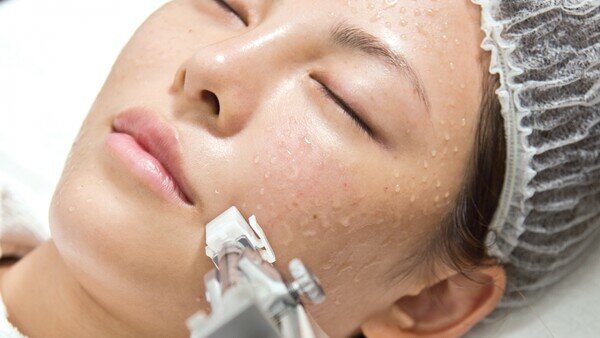The intradermal microinjection procedure used in cosmetic treatments is claimed to bring visible aesthetic effects in skin hydration, whiten, rejuvenation and facial contouring by injecting mixtures of substances directly into the dermis. Such claims in enhancing skin conditions have lured many beauty enthusiasts. The Consumer Council’s survey unveiled that, safety of some injectables is questionable, and the whole injection procedure is perilous. Consumers should, before receiving any invasive procedures, ensure that the procedure is performed by registered medical practitioner. They should also acquire a thorough understanding of the risks involved.
Microinjection through a device is a cosmetic procedure which involves intradermal injection to achieve various skin beautifying effects. Throughout the procedure, computerised device will control the depth, dosage and speed with the multiple micro-needles introducing injections into 0.4mm to 5mm below the skin surface. Among a variety of injectables, hyaluronic acid is the most commonly used. Since the procedure involves skin puncture and injection, it is classified as invasive and should only be performed by registered doctors.
The Council examined the websites of some 30 beauty salons which provide microinjection beauty service, and found that only 10 of them clearly listed that the procedures would be performed by registered doctors. The rest either claimed the procedures would be performed by “therapists”, or did not disclose the information at all.
As for the injectables, some beauty salons pointed up in marketing materials that customers can choose one injectable or a mixture of them, namely hyaluronic acid, botulinum toxin, vitamin c, placenta extracts and growth factor, etc. However, only some of the salons surveyed disclosed brands of injectables they used.
It is noteworthy to the consumers that quality of injectables could possibly vary among different brands. Casually mixing injectables made of unknown ingredients and complicated formula may not achieve the expected cosmetic effects. Instead, it may cause adverse effects and pose health risks.
Everyone’s skin is different in texture, elasticity and epidermis thickness. Therefore, technical skills are required in choosing the right injectables, their dosage and application positions. If the service providers lacked experience or technique and only aimed for cosmetic effects, improper or unsafe injection procedures would cause not only appearance issues but also serious consequences such as allergy, infection or permanent scars.
The Council’s study found that the entire procedure is risk prone. Consumers should take note that microinjection will leave numerous wounds on entire skin area. If cleansing and disinfection procedures are not performed properly, like makeup not thoroughly removed, or wounds not properly treated, the risk of infection will be increased.
Among the many injectables commonly used, botulinum toxin is a prescription drug and must be used by a doctor or under doctor’s supervision. Hyaluronic acid listed under the Voluntary Medical Device Administrative Control System is advised for better safety assurance. If a localized anaesthetic is used, it may belong to the Part 1 Poisons that must be used in accordance with professional advice from medical personnel.
The Council reminded consumers who are taking anti-blood clotting medications, pregnant, allergic to ingredients in the injectables or anaesthetics, have wounds or suffering from infections, have a tendency to develop keloids or granulomas to avoid taking such procedures.
When marketing or selling invasive cosmetic procedures such as microinjection, the Council urged the operators to explain clearly to their customers the detailed procedures and potential risks. They should also proactively provide their customers information including brands, models and ingredients of the injectables, charges, as well as the information of the device operators. In addition, consumers should be allowed to check the condition and expiry dates of the injectables. Before providing such services, operators should inquire about the consumers’ medical records to ensure the injectables won’t cause any allergic reactions.
In general, the effects of the microinjection can only last for a few months. Maintaining the cosmetic effects require frequent reapplication with possible increase in dosage in subsequent years. In view of the high cost and the risks of allergy, infections and scarring, consumers should think twice before taking such procedures. Before deciding whether to receive microinjection, consumers should take note of the following aspects:
Enquire about the injection procedures from their beauty salons including the cleanliness and safety of injectables and equipment used, as well as detailed charges. Attention should be paid on whether the needles come from newly opened packages and if the instrument probes touching their skin are replaced or sterilized.
The process should be conducted by registered medical practitioners. If consumers were referred by their respective beauty salons to take these procedures, they should request the salons to provide relevant information with doctors’ names and cross check their registration and professional qualifications;
Pay attention to the ingredients of the injectables provided by the beauty salons. Based on the ingredients, trace whether the product can be listed as medical device or must be registered as pharmaceutical products. It is advised that consumers should choose hyaluronic acid dermal filler that has been listed or registered pharmaceutical products;
Before injection, make sure the injectables are freshly opened and not yet expired;
After the procedure, seek medical advice immediately should there be any persistent pain, swelling and burning sensation. It is advisable to temporarily refrain from swimming, vigorous workouts and sun exposure.
The Consumer Council reserves all its right (including copyright) in respect of CHOICE magazine and Online CHOICE.



